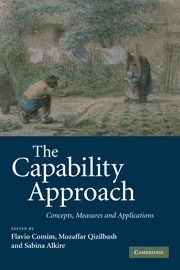Book contents
- Frontmatter
- Contents
- List of figures
- List of tables
- List of contributors
- List of acronyms
- Acknowledgements
- Introduction
- 1 Using the capability approach: prospective and evaluative analyses
- PART I Concepts
- 2 Amartya Sen's capability view: insightful sketch or distorted picture?
- 3 Sen's capability approach and feminist concerns
- 4 Beyond individual freedom and agency: structures of living together in the capability approach
- 5 Does identity matter? On the relevance of identity and interaction for capabilities
- 6 Measuring capabilities
- PART II Measures
- PART III Applications
- Index
- References
5 - Does identity matter? On the relevance of identity and interaction for capabilities
Published online by Cambridge University Press: 22 September 2009
- Frontmatter
- Contents
- List of figures
- List of tables
- List of contributors
- List of acronyms
- Acknowledgements
- Introduction
- 1 Using the capability approach: prospective and evaluative analyses
- PART I Concepts
- 2 Amartya Sen's capability view: insightful sketch or distorted picture?
- 3 Sen's capability approach and feminist concerns
- 4 Beyond individual freedom and agency: structures of living together in the capability approach
- 5 Does identity matter? On the relevance of identity and interaction for capabilities
- 6 Measuring capabilities
- PART II Measures
- PART III Applications
- Index
- References
Summary
Introduction
Sen went a long way within economic analysis of well-being. By developing his capability approach to understand people's quality of life, he tried to respond to weaknesses he detected in other theories that dealt with human well-being. In particular, he addressed strong criticism towards the utilitarian approach, no matter how utility might be interpreted. Modern economics employs ‘utility’ to illustrate everything that an individual maximises and that led to the fact that ‘(m)athematical exactness of formulation … proceeded hand in hand with remarkable inexactness of content’ (Sen 1999a (1985): 2). Opposing, therefore, this kind of simplification, ‘which has the effect of taking a very narrow view of human beings (and their feelings, ideas and actions), thereby significantly impoverishing the scope and reach of economic theory’ (Sen 1999a: 3), he proposes a view that sees a person's well-being in terms of his or her ‘functionings’, i.e. what the person succeeds in doing or being. Functionings are people's achievements and reflect their state of existence. The well-being of a person is the evaluation of this existence. Well-being, therefore, is not concerned only with the possession of commodities or the happiness or desire fulfilment those may produce, it also evaluates the conversion of the characteristics of those goods into functionings according to the person who possesses them. Furthermore, Sen is interested in the freedom a person has in terms of the choice of functionings, which he calls a person's ‘capability’. Capabilities refer to the functionings a person can achieve (Sen 1999a: 3–15).
- Type
- Chapter
- Information
- The Capability ApproachConcepts, Measures and Applications, pp. 125 - 156Publisher: Cambridge University PressPrint publication year: 2008
References
- 13
- Cited by



